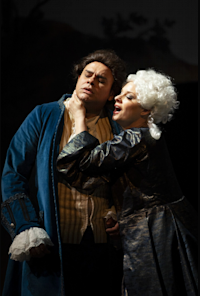Manon Lescaut, Puccini
Teilen
Opera and Ballet of Slovene National Theatre Maribor (2024)
Informationen von einer Kunstorganisation (verifiziert durch Operabase)
Manon Lescaut by Puccini, Ab (2024/2024), Unter der Regie von Pier Francesco Maestrini,, Dirigat Gabriel Bebeşelea, Slovensko narodno gledališče Maribor, Maribor, Slowenien
Aufführungskredite (Besetzung & Produktionsteam )
Dirigat
Regie
Besetzung
Manon Lescaut
Il Cavaliere Renato des Grieux
(Der Ritter René Des Grieux)
Lescaut
Geronte di Ravoir
(Geronte de Ravoir)
Edmondo
(Edmond)
Un lampionaio
(Ein Laternenanzünder)
L'oste
(Ein Wirt)
Un musico
(Ein Musiker)
Il maestro di ballo
(Der Tanzmeister)
Sergente degli arcieri
(Sergeant der Bogenschützen)
Il Comandante di Marina
(Der Marinekommandant)
Produktionsteam
Bühnenbild
Kostümbild
Chordirektion
Lichtgestaltung
Assistant Director
Ensemble
Orchester
Videos
1Fotos
12Weiterführende Literatur
Erfahren Sie mehr über den Komponisten
Erfahren Sie mehr über Werk




